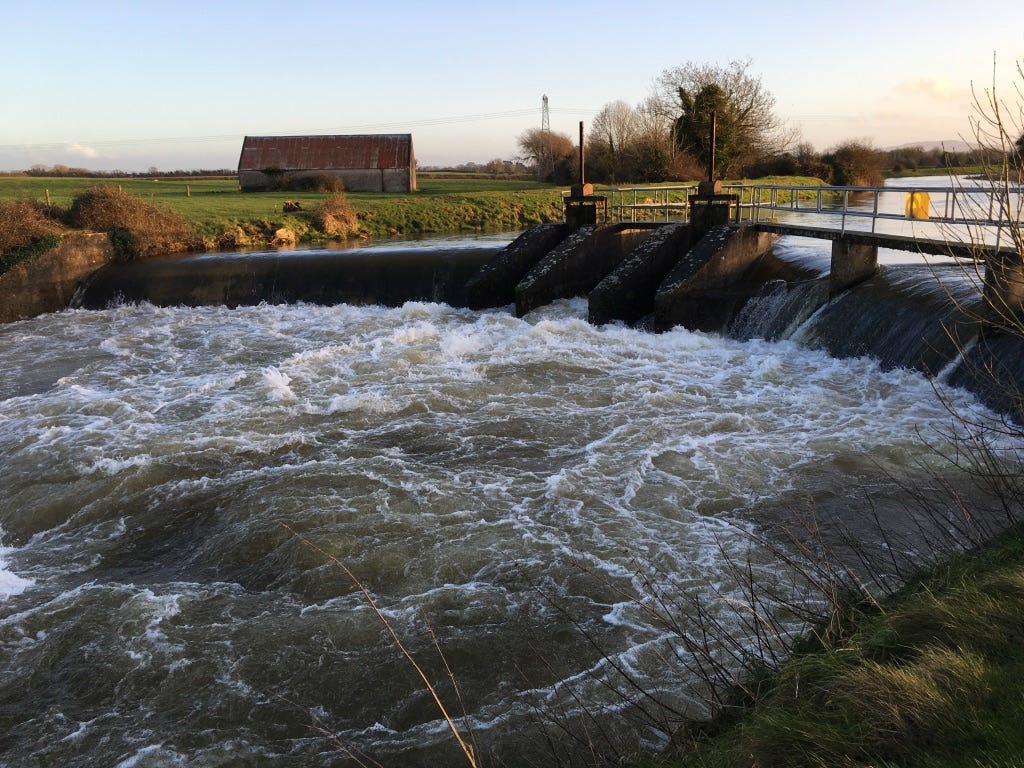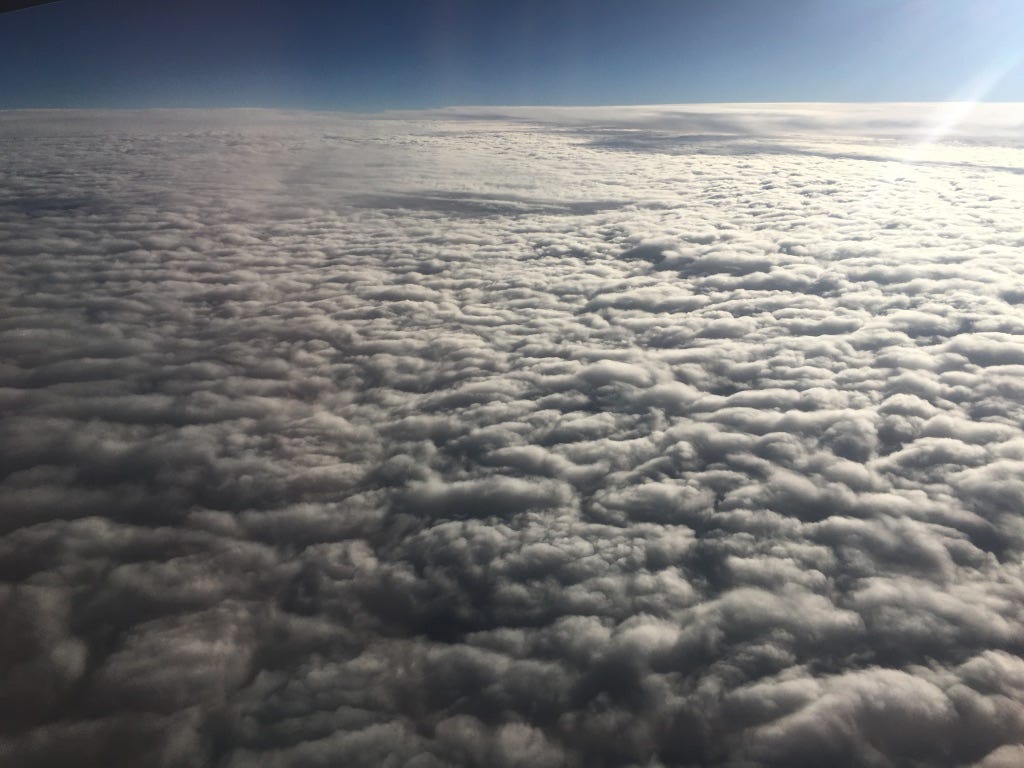River as a verb
A short riff from my notes

The habit of seeing the world as a collection of objects is baked into our language. A river (which even our eyes can see never stops changing and flowing) appears in our language as a noun, an object, "river", rather than as a process, an action; a verb.
But point at the river. What is it? Where is it?
It is the water flowing in front of you, yes.
It is also the thin stream in the high mountains.
It is the broad delta approaching the sea.
But if we stopped there, and called that the river, and cut it off from everything else, everything that wasn't the noun "river"... the "river" would be gone in a week.
The river is a circuit, a cycle, a process; leave out any part of that process, and there is no river, because the process is the river.
We call the water we can see "the river", but that's just a tribute to the limitations of our senses, and our consciousness.
The river continues on, out of the delta, and into the ocean.
Now the river is the water at the surface of the ocean, warming in the sun, becoming water vapour.
And now the river is the water vapour, drifting toward shore on the wind.
The river of water vapour approaches the mountain, cools, condenses to cloud.
The river of cloud turns to snow, and falls on the peaks of the mountain.
The river of snow melts, and trickles downhill, its rivulets joining to form the stream.
Sometimes the river is solid. Sometimes it is liquid. Sometimes it is gas.
But it's all, ultimately, the same water, at a different points in the cycle – points less obviously visible to us, given where we live, and the limitations of our senses.
The wind (another noun, treated by our language as an object, a thing, frozen, so that it needs an extra verb simply in order to move, even though it is nothing but motion! “The wind… er, blew”? How crazy is that!)… the wind is also, inextricably, the river. The river in motion through the sky.
The sunlight (another noun!), heating the water, driving the wind, is also the river. The very vibration of the water molecules that allows them to flow depends on it.
Without that light, delivered, ultimately, from the fusion process at the heart of the sun, the river would quickly move towards absolute zero. Those photons power the river.
And so the sun is also the river. They are inextricably linked; the sun’s light moves through the water, and without it, the water does not move. The river does not river.
The river is a verb, not a noun, a verb whose actions extend out beyond the surface of the planet.
The river is a dynamic, homeostatic, out-of-equilibrium process. The river, then, like any such process, is alive in time, it is time; you cannot pull it free of time, freeze it in a moment.
And that process is cyclical, and the cycle has two legs; an active leg, driven by nuclear fusion (which pushes the water up the mountain), and a passive leg, driven by gravity (which allows the water to descend the mountain again).
And that process is annual, is tied to the rotation of the earth around the sun, to the tilt of the earth as it spins. The snows of winter that melt in spring, that flow down to the ocean and evaporate in summer, all form the great, slow, year-long pulse of the river.
The deep wide waters of the spring floods are the river, but so is the dry riverbed of high summer.
The river is water, and the river is – in the right place, at the right time – the absence of water.
And that pulse is just one part of the intricate circulatory system of the living, breathing, growing, glowing earth, as it circles the tirelessly, endlessly, reliably rock-steady, weirdly unwavering, never-once-yet-interrupted, five-billion-year-old sun, a blaze of nuclear power three hundred and thirty-three thousand times more massive than our planet, a ball of incandescent gas big enough to contain over a million earths, a star that could effortlessly evaporate our entire world, mountains and all, in an instant, but which instead gently warms and cools our water, powers our rivers, drives our lives, day and night, winter and summer, in an endlessly sustaining cycle.
Can we see all this, with our limited human eyes, our limited human mind, evolved to simply survive, when we look at the river? No. We named the river long before we had writing, long before we knew the world was round. And so our language locks us away from truth. How can we talk about the river, when the simple word is so far from the complex reality?
Now do our solar system. (Another noun.)
Now do a galaxy. (Another noun.)
Now do the universe. (Another noun.)
Now do you.

CONTEXT/HOUSEKEEPING
The piece above is a little riff I wrote in my Roam notes recently, inspired by the water cycle, and by my extreme dislike for the dead language with which the water cycle is usually described. This riff, by the way, leaves out a great deal of the full water cycle, which is gloriously complicated, involving plants and groundwater and oceanic circulation and even volcanic steam and dust; I’m just looking at some aspects of it, through the lens of a single river, while trying to get across something more than “The water cycle, also known as the hydrologic cycle or the hydrological cycle, is a biogeochemical cycle that describes the continuous movement of water on, above and below the surface of the Earth…”
I’ve pulled this riff out of my notes, polished it up a little, and posted it here, as part of my attempt to bring you backstage, behind the scenes of the writing process. I’m not sure if this particular riff will make it into the final book or not, but I like it, and so here it is. Now, some housekeeping notes…
LONDON TRIP
I’m flying to London tomorrow for a few days, to meet my lovely agent Charlie, and some other charming people. Greatly looking forward to it; the pandemic started just when I was thinking of travelling again after the incredibly busy months following the birth of our son (not mine and Charlie’s; mine and Solana’s), and so, between those two world-changing events, I haven’t been to London for over three years. If any of you have suggestions for things I should do while in London, put them in the comments – or if you received this by email, just answer the email.
ZOOM CALL
I’m also planning to do my first Zoom call soon for paid subscribers, as a thank-you for their support. After the London trip seems a good time to do it, as I will have FRESH LONDON LITERARY GOSSIP, to mix in with news of my progress on the book. I’ll also be taking questions, and asking for feedback on what works and what doesn’t. So, if you were vaguely thinking about becoming a paying subscriber, now’s the ideal time. I’ll email all paying subscribers the week after I return from London, with more details. (Finding a timezone that suits everyone is always a problem – hi Australia! – so I may schedule two calls over the next few weeks, one for subscribers in the Americas, and another for those in Europe.) I’m just mentioning this in case some people on the free list would enjoy this chat, and were thinking of paying anyway; but don’t feel any pressure to pay. I already value your time and attention, as a free subscriber. This is just a light-hearted Zoom call, to chat about how the book is going, it’s not vital that you hear it. Remember, all posts are free to everyone; becoming a paid supporter isn’t like buying a product – I’m happy to give you the product as a gift, because I just want the ideas to spread – it’s more like becoming a personal patron of an artist you like. Only do it if you want to, and you have the money. And so these occasional Zoom calls are just a way for me to say hi and thanks to the people who are helping buy me some of the time to do this peculiar work.
I’m probably also going to post Chapter One of the book after London. It’s ready, I think. And then a more technical but fun post on the role of magnetic fields in an evolved universe. We shall see. Anyway, it’s great to feel semi-healthy again, after a rough week spent mostly in bed, swearing.
Look after each other…



Hi Julian, I did like this post. Not to be too fancy pants, but it did remind me of Thich Nhat Hanh's words in The Art of Living. Not that I have those words reverberating around my head on speed dial, I just happened to pick it up as some bed time reading last night.
Reminds me of Heraclitus - no man ever stepped into the same river twice, as he, and the river, are always changing.